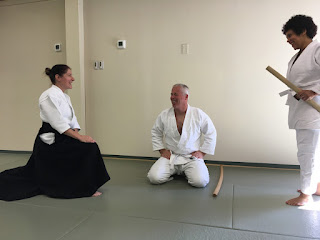Relationships are the Most Important Thing
In Japanese, the term “kai” means a group or association. In the context of budō, kai typically refers to a group training together in the same art. Within Itten Dōjō, there are three, separate kai: the aikijutsu-kai (Aikijutsu Tendōkai), the kenjutsu-kai (Ono-ha Ittō-ryū), and the iaidō-kai (Musō Jikiden Eishin-ryū). Each of the groups is independent of the others, but every person training with us is first and foremost a member of the dōjō and we all support each other, regardless of our individual interests. Many members train in more than one art.
Different martial arts organizations have wildly differing views on what actually is most important in training — at least this has been our experience, and I think we can make a strong claim to having seen it all. Believe me, it wasn’t all good.
Itten Dōjō is now in its 30th year, and several of us had decades of training prior to the founding of the dōjō. Over the course of the past three decades, we’ve come to believe that relationships are the most important thing.
During a recent promotion ceremony for my two senior-most students in aikijutsu — one of whom also helped found the dōjō — I mentioned that our dōjō in 30 years has gone through a lot of changes. Changes in location, changes in the arts we practiced, changes in the high-level instructors with whom we’ve trained. The one thing that has never changed has been our focus, and that has always been on the members of our dōjō.
Oddly enough, this focus has sometimes caused problems for us, temporary disruptions that in every instance led to long-term enhancement of the dōjō and benefit to its members. Something we’ve gone through again, in the recent past, but appears to have opened doors we never would have anticipated.
Budō has profound potential to improve lives, across a range of applications far beyond the skills of personal combat. Our focus is providing techniques, tools, and insights that members of our dōjō can use to become more disciplined, more fit, more capable, and even more joyful. All within a diverse community that is as mutually supportive as it is high achieving.
Although our primary is inward, we are not insular or parochial — we recognize the very great value of having relationships that extend outward and above the dōjō itself. For that reason, we treasure affiliations with high-level instructors, dōjō, and organizations with whom our values and goals are in close accord. We currently enjoy two such relationships, and are in the process of establishing a third. Ultimately, our goal is to ensure members of Itten Dōjō have access to the finest instruction available in the world, and that ranks awarded our members are recognized and can be validated world-wide.
The iaidō-kai trains under Nicklaus Suino, Director of the Japanese Martial Arts Center in Ann Arbor, Michigan. Suino Sensei’s personal mission is, “to learn the fundamental principles of success, apply them, and share them with people who want to work on building a better life.” And he pursues this mission across a range of endeavors:
• Martial arts, of course.
• Permission — Powerful, immersive, 12-hour events helping participants overcome personal obstacles to create more fulfilling lives.
• Authoring books addressing a range of topics.
• Entrepreneurial activities that provide livelihood and engagement for persons he employs.
Ranks within the iaidō-kai are awarded by Suino Sensei in recognition of successful examinations and meeting associated criteria, and are certified by the Shudokan Martial Arts Association, an international organization supporting traditional, Japanese budō.
Our kenjutsu-kai is an authorized training group — one of three in the United States — under the auspices of Yabuki Yūji, 18th and current headmaster of the Ono-ha Ittō-ryū at the Reigakudō Dōjō in Tōkyō. Yabuki Dōshu states his mission as, “I want to help educate and bring to society people who can put these (principles of Ittō-ryū) into practice. Although this art was developed to annihilate an enemy, if we sublimate it we can use the idea behind kiriotoshi in our society. By doing kiriotoshi, by cutting out the unhealthy parts in our heart and mind with a ‘round’ calmness and softness we can contribute to a world of harmony and peace. My wish is for Reigakudō to bring to society people of these qualities.”
The name “Reigakudō” means “Etiquette Study Hall,” the name clearly implying there is more to the study of swordsmanship than the ability to beat someone in a duel. Ranks and licenses awarded by Yabuki Dōshu are certified by the Reigakudō Foundation, a non-profit corporation supporting the dōjō and development of persons with “reverence for God, respect for others, and love of one’s country.”
While our aikijutsu-kai is currently unaffiliated, we anticipate that will change in the near future. We are building a relationship that, if all works out as hoped, will provide membership in an exclusive, domestic organization for endorsement of ranks awarded within our aikijutsu-kai, as well as a second-tier membership in a budō association based in Tōkyō.
The arts of traditional budō are treasures, and we have a deep and distinct responsibility to do everything we can to preserve and pass on the arts, as we’ve received them. We do not, however, agree at all with some that have tried to convince us our allegiance to an art or organization should take precedence over everything else in our lives — including faith and family. That viewpoint is a gross corruption of budō. It never has been, and never will be, a viewpoint that has any place in our dōjō.
To learn more about the arts we study and the benefits of establishing a relationship with Itten Dōjō, visit:
https://ittendojo.org/aikijutsu.htm




Comments
Post a Comment